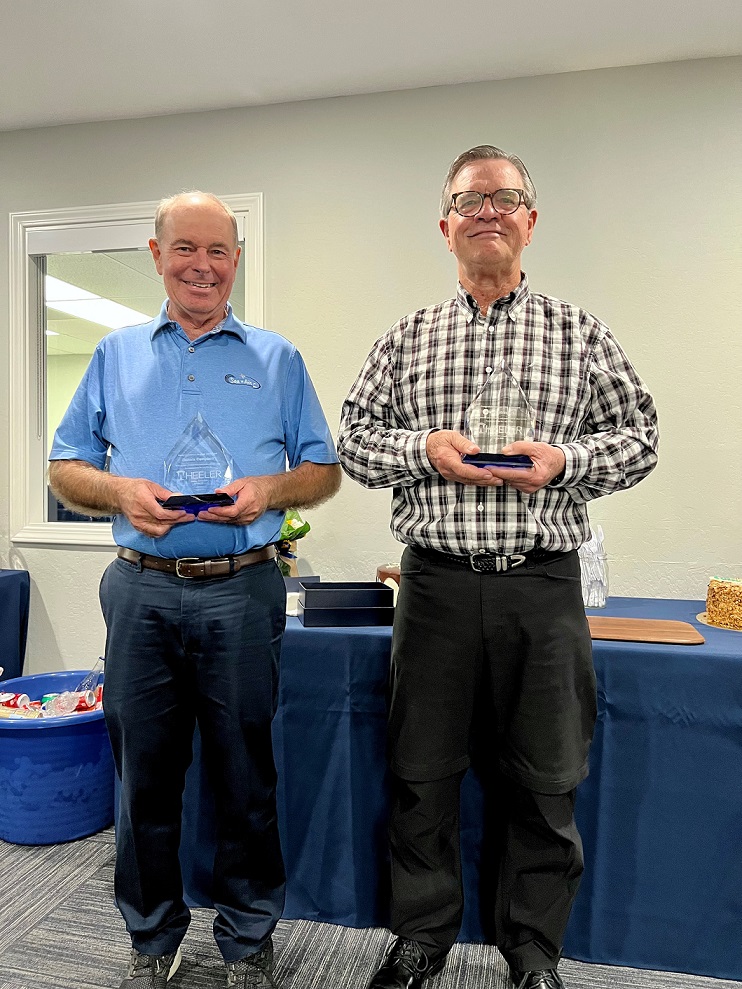While tax season may seem far away, the reality is that there is only one month left in the year. Now is the perfect time to review withholding and estimated tax payments to avoid a surprise tax bill next year.
Continue readingTaxpayer Alert: Significant Increase in Texting Scams
To date, the IRS has identified and reported thousands of fraudulent domains tied to multiple text scams, known as smishing, targeting taxpayers. Recently, IRS-themed smishing has increased significantly. As such, taxpayers are reminded to be on the lookout for scams and schemes that could put sensitive tax data at risk – especially this latest IRS-themed texting scams aimed at stealing personal and financial information.
Continue readingBeware Third Parties Promoting Improper ERC Claims
Taxpayers are always responsible for the information reported on their tax returns. Businesses are encouraged to be cautious of advertised schemes and direct solicitations promising tax savings that are too good to be true.
As such, employers should be wary of third parties taking improper positions related to taxpayer eligibility for and computation of the credit – advising them to claim the Employee Retention Credit (ERC) when they may not qualify. These third parties often charge large upfront fees or a fee contingent on the refund amount. Further, they may not inform taxpayers that wage deductions claimed on the business’s federal income tax return must be reduced by the amount of the credit.
Improperly claiming the ERC could result in taxpayers being required to repay the credit along with penalties and interest. Suppose the business filed an income tax return deducting qualified wages before it filed an employment tax return claiming the credit. In that case, the business should file an amended income tax return to correct any overstated wage deduction.
What is the Employee Retention Credit (ERC)?
The ERC is a refundable tax credit designed for businesses that continued paying employees while shut down due to the COVID-19 pandemic or had significant declines in gross receipts from March 13, 2020, to December 31, 2021. Eligible taxpayers can claim the ERC on an original or amended employment tax return for a period within those dates.
To be eligible for the ERC, employers must have:
- Sustained a full or partial suspension of operations due to orders from an appropriate governmental authority limiting commerce, travel, or group meetings due to COVID-19 during 2020 or the first three quarters of 2021,
- Experienced a significant decline in gross receipts during 2020 or a decline in gross receipts during the first three quarters of 2021, or
- Qualified as a recovery startup business for the third or fourth quarters Guidance on the Employee Retention Credit under the CARES Act for the First and Second Calendar Quarters of 2021 Notice 2021-2 of 2021.
As a reminder, only recovery startup businesses are eligible for the ERC in the fourth quarter of 2021. Additionally, for any quarter, eligible employers cannot claim the ERC on wages reported as payroll costs in obtaining PPP loan forgiveness or used to claim certain other tax credits.
To report tax-related illegal activities relating to ERC claims, submit Form 3949-A, Information Referral. You should also report instances of fraud and IRS-related phishing attempts to the Treasury Inspector General for Tax Administration at 800-366-4484.
Tips for Avoiding an IRS Tax Audit

Although the chances of taxpayers being audited have declined in recent years, with taxes becoming more complicated every year, there is always the possibility that a tax mistake turns into an IRS tax audit. Avoiding “red flags” like the ones listed below could help.
Continue readingYear-end Tax Planning Strategies for Individuals

With the end of the year fast approaching, now is the time to take a closer look at tax planning strategies that could reduce your tax bill for 2022.
Continue readingYear-end Tax Planning Strategies for Business Owners

Several end-of-year tax planning strategies are available to business owners to reduce their tax liability. Let’s take a look:
Continue readingThe WCPA Open Houses
October was a busy month at Wheeler Accountants, and not just because of the many extended returns we filed!
Following the conclusion of another busy October 15th deadline, WCPA hosted two open houses for the Watsonville and San Jose communities to mingle with the firm and get to know the team.
Both events featured tacos and burritos from Tacos El Jerry, an oyster bar from H&H Fresh Fish, and a variety of drinks and desserts. The Watsonville open house also doubled as a celebration for the retirements of Steve Stringari and Dennis Campbell.
Both events were a big success and we look forward to getting to see even more of our clients and friends next year!
Congratulations to Steve Stringari & Dennis Campbell!

Last week, Wheeler’s Watsonville office held a celebration acknowledging the retirements of Dennis Campbell and Steve Stringari.
Wheeler’s partners met Steve and Dennis the same way they met several other practitioners through Michael Bryant’s peer reviews. As is often the case, during their peer review the topic of retirement came up. After a few more meetings and lunches, the framework of a deal was in place.
For Steve and Dennis, an acquisition presented the opportunity for them to find a home for their clients. For Wheeler, it expanded our firm presence “over the hill” where we have a few partners and staff that live in Watsonville.
Steve and Dennis were clear from the outset that they wanted three things. First, they wanted their clients taken care of. Second, they wanted the reputation of their firm maintained. Third, they wanted to work less. The last one took a few years to get squared away, but we finally made it happen.
Dennis has been proactive and diligent with his work and a patient teacher and mentor to others in the firm. Steve was beloved by many of his clients, trusted completely, and he wanted to be able to help everyone.
Steve and Dennis were big shoes to fill, and if that’s the case then Evan Benevento must have four feet. Evan is unafraid of hard work, bright, a quick learner, passionate, and always willing to learn and improve. Evan has jumped right into getting involved in the community via Rotary, business networking events and other local causes.
We celebrate the conclusion of two incredibly successful careers, marked by a commitment to their clients and a strong connection with the Watsonville community. Congratulations to Steve and Dennis on your retirements!
Employee Spotlight – Q3 2022
2022’s third employee spotlight is a triple feature as April Gomez, Sydni Andrus and Linh Nguyen all earned the title of Employee of the Quarter with their hard work and resourcefulness.
April is patient and informative. One of the newest members of the admin team, she quickly learned the firm procedures and played a key role in a smooth October 15th deadline. April takes ownership of her work and provides excellent client service.
Sydni was a great resource this quarter, rolling up her sleeves to provide training and guide staff accountant Claudia Chavez through her first few weeks at the firm. Sydni has also stepped up in her attest work while Alex Baron is away participating in the UK Secondment Program. Sydni is a team player, learns quickly and has a positive attitude.
Linh has been very diligent this quarter in preparing business returns. She is detail-oriented, takes astute notes, and provides in-depth explanations of her thought process to aid her reviewers. She was a big help through the September 15th deadline.
Congratulations to April, Sydni and Linh for being selected as our Employees of the Quarter!
Business-related Travel Deductions
Business travel deductions are available when employees travel away from their tax home or principal place of work for business reasons. With inflation on the rise, business travel is more costly than ever. Hotel bills, airfare or train tickets, cab fares, and public transportation can all add up fast.
The good news is that business travelers may be able to off-set some of those costs by claiming business travel deductions when they file their taxes. Let’s take a look at a few details that every business traveler should know about:
- The travel period must be substantially longer than an ordinary day’s work and a need for sleep or rest to meet the demands of the work while away.
- Travel expenses must be ordinary and necessary. They can’t be lavish, extravagant, or for personal purposes.
- Employers can deduct travel expenses (see below) paid or incurred during a temporary work assignment if the assignment length does not exceed one year.
- Travel expenses for conventions are deductible if attendance benefits your trade or business (you can’t deduct the travel expenses for your family). You can’t deduct the expenses if the convention is for investment, political, social, or other purposes unrelated to your trade or business. There are special rules for conventions held outside North America.
Deductible travel expenses while away from home include the costs of:
- Travel by airplane, train, bus, or car between your home and your business destination.
- Fares for taxis or other types of transportation between an airport or train station to a hotel, from a hotel to a work location.
- Shipping of baggage and sample or display material between regular and temporary work locations.
- Using a personally owned car for business, which can include an increase in mileage rates.
- Lodging and non-entertainment-related meals.
- Dry cleaning and laundry.
- Business calls and communication.
- Tips paid for services related to any of these expenses.
- Other similar ordinary and necessary expenses related to business travel.
Self-employed or farmers with travel deductions
Self-employed individuals can deduct travel expenses on Schedule C (Form 1040), Profit or Loss From Business (Sole Proprietorship). Farmers should use Schedule F (Form 1040), Profit or Loss From Farming.
Travel deductions for the National Guard or military reserves
National Guard or military reserve service members can claim a deduction for unreimbursed travel expenses paid during the performance of their duty.
Recordkeeping
Well-organized records make it easier to prepare a tax return and help provide answers if your return is selected for examination or if you receive an IRS notice. You must keep records, such as receipts, canceled checks, and other documents that support an item of income, a deduction, or a credit appearing on a return.
Questions?
If you have questions about business-related travel deductions, don’t hesitate to call the office.
San Jose: (408) 252-1800
Watsonville: (831) 726-8500




